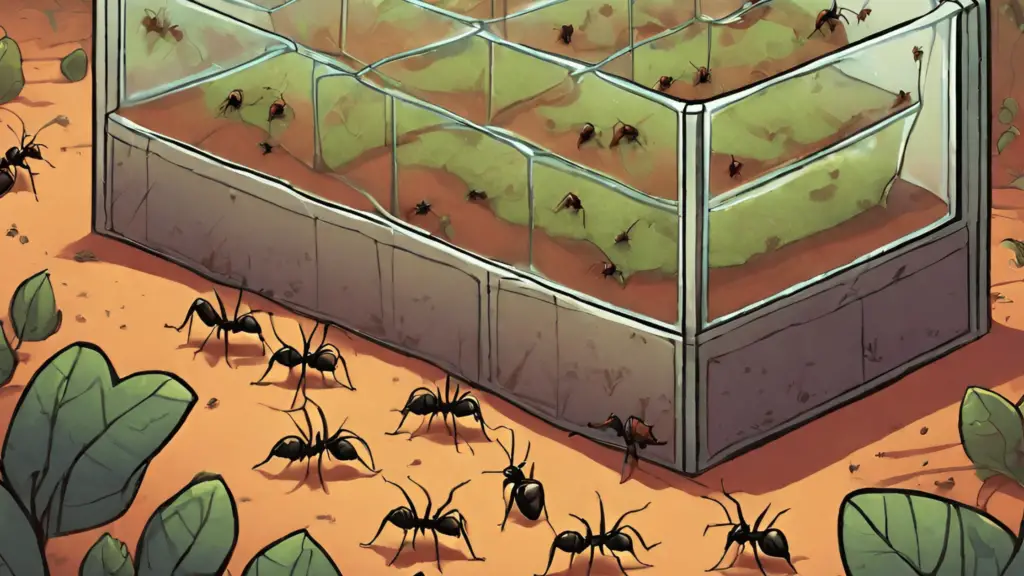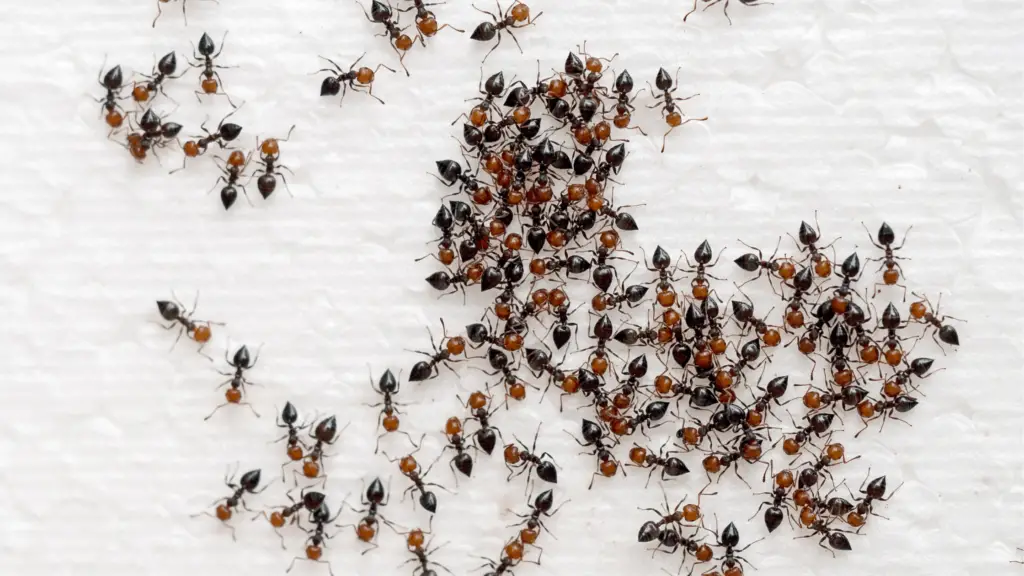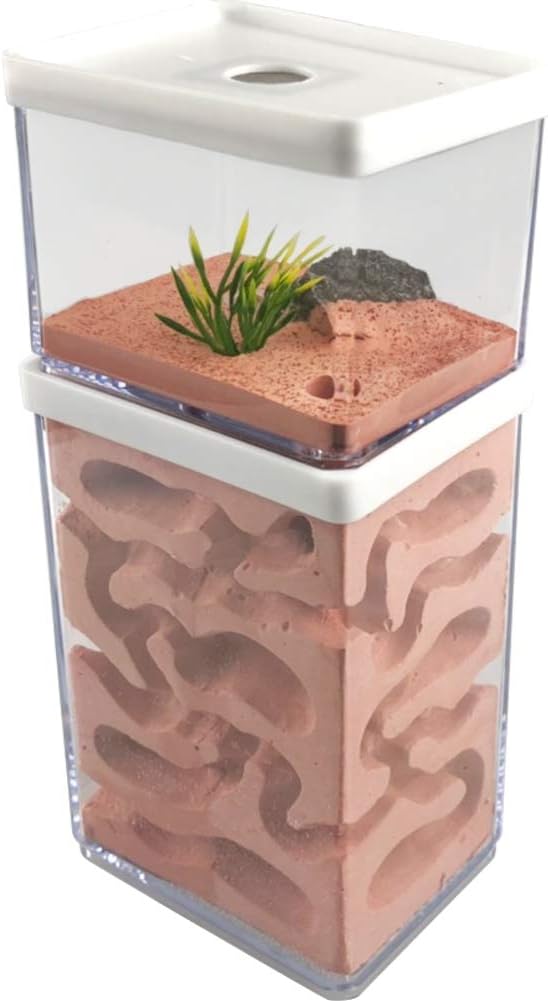Ant-keeping is a fascinating hobby that has gained popularity in recent years.
As social insects, ants display complex behaviors and have a highly organized structure within their colonies.
If you’re looking for a new and exciting hobby, ant keeping may be worth considering.
This article contains affiliate links. If you make a purchase through a link on our site you are supporting our continued efforts to educate people like you in finding new and rewarding hobbies. Thank you!

Before you start ant keeping, it’s important to do your research and understand the basics.
This beginner’s guide will provide an overview of popular ant species for beginners, factors to consider when choosing a species, creating a suitable habitat, feeding and caring for your ants, and much more.
With the right knowledge and preparation, ant keeping can be a rewarding and educational experience for people of all ages.
Understanding Ants

Ants are fascinating insects that live in large colonies and exhibit complex social behavior. In this section, we will explore the biology, species, and behavior of ants to help you understand these tiny creatures better.
Ant Biology
Ants belong to the family Formicidae and are closely related to wasps and bees. They have a distinct head, thorax, and abdomen, and their bodies are covered in a hard exoskeleton. Ants have six legs, two antennae, and powerful jaws that they use to carry food and defend themselves.
Ants have a unique reproductive system where the queen ant lays eggs, and the worker ants take care of the young and maintain the nest. The queen ant can live for several years and can lay thousands of eggs in her lifetime.
Ant Species
There are over 12,000 species of ants worldwide, and each species has unique characteristics and behaviors. Some of the most popular ant species for keeping as pets include the Messor Barbarus, Lasius Niger, and Camponotus species.
When choosing an ant species to keep, it is essential to consider factors such as temperature, humidity, and food requirements. Some species require specific conditions to thrive, while others are more adaptable.
Ant Behavior
Ants are social insects and live in large colonies where they work together to maintain the nest and care for the young. They communicate with each other using pheromones and can navigate complex environments to find food and resources.
Ants exhibit various behaviors, such as foraging, nest building, and defense. Some species are known for their ability to cultivate fungus, while others are predators that hunt other insects for food.
In conclusion, understanding the biology, species, and behavior of ants is crucial for anyone interested in ant keeping as a hobby. By learning more about these fascinating insects, you can create a suitable environment for your ants and provide them with the care they need to thrive.
Getting Started with Ant-Keeping

Ant keeping is a fascinating and educational hobby that can be enjoyed by people of all ages. If you’re interested in starting your own ant colony, there are a few things you need to know before you get started.
Choosing the Right Ant Species
The first thing you need to do is choose the right ant species for your colony. There are many different species of ants, and each has its own unique characteristics and requirements. Some species are better suited for beginners, while others are more challenging to keep.
When choosing a species, consider factors such as the size of the colony, the type of food they require, and their habitat requirements. Some popular species for beginners include the Lasius niger (Black Garden Ant), Camponotus herculeanus (Giant Carpenter Ant), and Formica fusca (Black Ant).
Finding or Buying Ants
Once you’ve chosen the right species for your colony, you’ll need to find or buy ants. There are two main ways to obtain ants: catching them in the wild or buying them from a supplier.
Catching ants in the wild can be a fun and rewarding experience, but it can also be challenging. You’ll need to find a queen ant and her workers, which can be difficult depending on the species and the time of year. If you’re new to ant keeping, it’s often easier to buy a starter colony from a reputable supplier.
Legal Considerations
Before you start your ant colony, it’s important to be aware of any legal considerations in your area. Some species of ants are protected by law, and it may be illegal to keep them as pets without a permit.
To avoid any legal issues, do your research and make sure you’re not breaking any laws by keeping ants as pets. You can also check with your local wildlife agency or department of agriculture to find out if there are any restrictions or regulations you need to be aware of.
By following these basic guidelines, you’ll be well on your way to starting your own ant colony and enjoying the fascinating world of ant keeping.
Creating the Perfect Habitat

Ants are social insects that require a suitable habitat to thrive. Creating the perfect habitat for your ant colony is crucial for their survival and growth. In this section, we will discuss the key factors to consider when creating a suitable habitat for your ants.
Choosing the Right Ant Farm
Choosing the right ant farm is an important first step in creating the perfect habitat for your ants. There are different types of ant farms available in the market, including acrylic, glass, and sand ant farms. Each type has its advantages and disadvantages, so it’s essential to choose one that suits your needs and the type of ant species you plan to keep.
Acrylic ant farms are durable and easy to clean, making them suitable for beginners. Glass ant farms are more fragile but provide better visibility of your ants. Sand ant farms are ideal for species that require a dry environment, but they can be challenging to maintain.
Setting Up the Ant Farm
Once you have chosen the right ant farm, it’s time to set it up. Start by adding a layer of substrate, such as sand or soil, to the bottom of the ant farm.
This will provide a suitable environment for your ants to burrow and nest. Next, add a source of moisture, such as a water feeder or a moist cotton ball, to keep the humidity levels in the ant farm optimal.
You can also add decorations, such as rocks or twigs, to create a more natural environment for your ants. Just make sure they are clean and do not contain any harmful chemicals.
Maintaining the Right Environment
Maintaining the right environment is crucial for the health and well-being of your ants. Make sure to monitor the temperature and humidity levels regularly and adjust them as necessary. The ideal temperature for most ant species is between 20-25°C, and the humidity levels should be between 50-70%.
You should also provide your ants with a source of food and water regularly. Ants require a balanced diet of proteins, carbohydrates, and fats, so make sure to provide a variety of food sources, such as seeds, fruits, and insects. You can also provide a sugar water solution as a source of carbohydrates.
In conclusion, creating the perfect habitat for your ant colony is crucial for their survival and growth. Choose the right ant farm, set it up correctly, and maintain the right environment, and you will have a thriving ant colony in no time.
Feeding Your Ants

Ants are omnivores, which means they eat both plant and animal matter. As a beginner ant keeper, it’s important to understand the dietary needs of your ant colony to ensure their health and well-being.
Understanding Ant Diets
Different ant species have different dietary needs. Some ants are primarily herbivores and feed on plant matter, while others are carnivores and feed on other insects. It’s important to research the dietary needs of your specific ant species to ensure you are providing them with the correct food.
As a general rule, ants require a balanced diet of protein, carbohydrates, and lipids. Protein-rich foods include insects such as fruit flies, crickets, and mealworms. Carbohydrates serve as a primary energy source for ants, and sugary substances like honey, sugar water, and diluted fruit juices can be excellent carbohydrate sources for your ant colony. Lipids, or fats, are essential for maintaining cell structure and function and can be found in foods such as nuts and seeds.
Feeding Schedule
Ants require frequent feeding, but the frequency and amount of food will depend on the size of your colony. As a general rule, small colonies require feeding every 2-3 days, while larger colonies may require daily feedings.
It’s important not to overfeed your ants, as excess food can lead to mold growth and attract unwanted pests. A good rule of thumb is to provide your ants with a small amount of food that they can consume within 24 hours.
What Not to Feed
While ants are omnivores, there are some foods you should avoid feeding them. Foods that are high in salt, sugar, or spices should be avoided, as they can be harmful to your ant colony. Additionally, avoid feeding your ants any food treated with pesticides or other chemicals.
In conclusion, understanding the dietary needs of your ant colony is essential for their health and well-being. By providing your ants with a balanced diet of protein, carbohydrates, and lipids and avoiding harmful foods, you can ensure that your ant colony thrives.
Daily Care and Maintenance

When it comes to keeping ants as pets, daily care and maintenance are essential to ensure their health and well-being. Here are some tips on how to take care of your ant farm:
Cleaning the Ant Farm
Ant farms require regular cleaning to prevent the buildup of waste and debris. You should remove any dead ants, uneaten food, and debris from the ant farm daily.
Once a week, you should also clean the entire ant farm using a damp cloth or paper towel. Avoid using any cleaning products that contain chemicals, as these can be harmful to the ants.
Monitoring Ant Health
It’s important to monitor your ants’ health regularly to ensure that they are healthy and thriving. Keep an eye on their behavior and look out for any signs of illness or stress. If you notice any issues, such as lethargy, aggression, or discoloration, it’s important to address them promptly.
Handling Ants Safely
When handling your ants, it’s important to do so safely to avoid injuring them or yourself. Avoid touching the ants directly with your hands, as this can stress them out and cause them to become aggressive. Instead, use a pair of tweezers or a small brush to handle them gently.
Overall, taking care of ants as pets requires a bit of effort and attention, but it can be a rewarding and fascinating hobby. With proper care and maintenance, your ant farm can provide you with hours of entertainment and education.
Potential Challenges

Ant keeping can be a rewarding hobby, but it’s not without its challenges. Here are a few potential obstacles you may encounter and how to address them.
Preventing Escapes
One of the most significant challenges of ant keeping is preventing your ants from escaping. Ants are tiny and can squeeze through even the smallest gaps, so it’s essential to make sure their enclosure is secure. Here are a few ways to prevent escapes:
- Use a formicarium with a tight-fitting lid.
- Apply a thin layer of baby powder or fluon to the walls of the enclosure to make them too slippery for the ants to climb.
- Keep the enclosure away from doors, windows, and other openings that could provide an escape route.
Dealing with Ant Death
Ants can die for a variety of reasons, including old age, illness, and stress. When an ant dies, it’s essential to remove the body promptly to prevent the spread of disease. Here are a few things you can do to deal with ant death:
- Use a pair of tweezers to remove the body and dispose of it.
- Monitor your ants’ behavior and environment to identify any potential stressors.
- Keep the enclosure clean and free of debris and dead insects.
Addressing Overpopulation
As your ant colony grows, it may become overcrowded, leading to stress, aggression, and even cannibalism.
To prevent overpopulation, you may need to split your colony into smaller groups or move some ants to a new enclosure. Here are a few things to keep in mind when addressing overpopulation:
- Monitor your colony’s growth and behavior to identify signs of overpopulation.
- Consider moving some ants to a new enclosure or splitting the colony into smaller groups.
- Make sure each group has enough food, water, and space to thrive.
Conclusion

In conclusion, ant keeping is a fascinating and rewarding hobby that offers numerous benefits. By observing and caring for your ant colony, you can learn about insect behavior and gain a deeper appreciation for the natural world. Ant keeping can also be a relaxing and meditative activity, providing a break from the stresses of daily life.
To get started with ant keeping, it is important to choose the right species for your home and provide them with a suitable habitat. Popular ant species for beginners include the Black Garden Ant and the Harvester Ant. You will also need to provide your ants with food and water, and monitor their health and behavior regularly.
When it comes to ant keeping supplies, there are many options available. Some essential items include an ant farm or terrarium, a water dispenser, and a feeding dish. You may also want to consider adding decorations or accessories to your ant habitat, such as rocks or plants.
As you gain more experience with ant keeping, you may want to try your hand at breeding or expanding your colony. With patience and dedication, you can create a thriving ant colony that will provide you with years of enjoyment and learning opportunities.
So why not give ant keeping a try? With the right knowledge and preparation, you can embark on a rewarding journey into the fascinating world of myrmecology.
Frequently Asked Questions

What are some recommended ant species for beginners?
If you are new to ant keeping, it is recommended that you start with a beginner-friendly ant species such as Camponotus Pennsylvanicus (Black Carpenter Ant), Lasius Niger (Black Garden Ant), or Messor Barbarus (Harvester Ant).
These ants are known for their low maintenance requirements, adaptability to various environments, and relatively docile nature, making them ideal for ant-keeping beginners.
What supplies do I need to start keeping ants as a hobby?
To start keeping ants as a hobby, you will need a few essential supplies, including an ant farm or formicarium, a test tube or other container for housing the queen and her brood, a feeding dish, and a water source.
Optional supplies include a heating mat, a humidity gauge, and a magnifying glass for observing your ants.
How do I set up and maintain an ant colony?
To set up an ant colony, you need to provide a suitable habitat for your ants, which includes a nest area, a food source, and a water source. You also need to ensure that the temperature and humidity levels are appropriate for your ant species. To maintain your ant colony, you will need to regularly feed them, provide them with water, and clean their habitat as necessary.
Can I keep ants without a queen?
No, you cannot keep ants without a queen. The queen is the heart of the colony and is responsible for laying eggs, which are essential for the survival of the colony. Without a queen, the colony will eventually die out.
Where can I purchase ant colonies or starter kits?
You can purchase ant colonies or starter kits from reputable online retailers or local pet stores. It is important to ensure that the ants you are purchasing are legal to keep in your area and that they are from a reliable source.
Is ant keeping a low-maintenance hobby?
While ant keeping can be a relatively low-maintenance hobby, it still requires regular care and attention to ensure the health and well-being of your ants. You will need to regularly feed your ants, provide them with water, and clean their habitat as necessary. Additionally, some ant species may require specific temperature and humidity levels, which may require additional maintenance.



